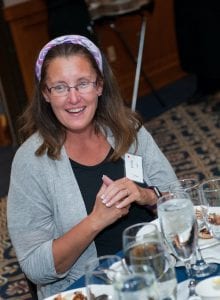 UConn 4-H is a statewide program with educators in all eight counties. Each of our 4-H educators brings unique skills and life experiences to the program.
UConn 4-H is a statewide program with educators in all eight counties. Each of our 4-H educators brings unique skills and life experiences to the program.
If there is one experience that has opened Emily Alger’s eyes to how special the 4-H program is, it would be asking the high school field hockey team that she coaches to participate in the National 4-H Science Experiment. Each year National 4-H Council introduces a new science experiment that 4-H members across the country take part in. In 2017 the Science Day Challenge was “Incredible Wearables”, a hands-on STEM project that challenges young people to build a wearable fitness tracker that will help people lead healthier lives. Emily explains that, “the team is not exposed to 4-H activities or our culture. Yet I walk in and hand them the science kits and the handbook, divide them into groups and ask them to complete the experiment, and every year I get responses saying it was my favorite activity of the year and we should be doing this in school.” Emily adds, “You can’t understand the impact of what we do until you introduce it to youth outside of the program and see their responses.”
As the Middlesex County 4-H Program Coordinator, Emily works with a variety of exciting and unique programs. Her introduction to 4-H came as a member at the age of seven. Emily participated in a variety of projects and was a regular participant in the 4-H fair. It remains to this day one of the aspects of her work that she is most proud of, emphasizing the patience and nurturing necessary to commit to a youth driven program such as the 4-H Fair.
“We were the first fair to have an entire youth board of directors. There are no voting adults in Middlesex County. Each youth is paired with a mentor and is responsible for their job description. We have a full fair manual. Everybody has to complete and submit reports. It’s really run by the youth. It takes a lot of follow-up to make sure that things move forward smoothly, but we are committed to it. I think the place it shows up the most is that our millennials are dying to get back into this program and mentor. Not only did they learn how to do a job and take pride in it, they want to teach another youth to do that job. They want to be the person who passes that on. They recognize they don’t have the time or space to be traditional club leaders, but they recognize how important the program has been to their life,” she says.
Emily was also destined to be around animals. As a 4-H member her project work focused on smaller animals such as poultry and rabbits. It wasn’t until she graduated from college that she got her first horse. She initially began volunteering with the 4-H horse program, serving on the State 4-H Horse Advisory Committee and helping to put on horse shows. This led to her current role as the statewide 4-H Equine Program Coordinator.
Emily works extensively with UConn Equine Extension Specialist, Dr. Jenifer Nadeau. Both bring a wealth of personal experience and knowledge to the UConn 4-H Horse Program. Emily feels the program is well respected. Very few youths in Connecticut have the luxury of owning a horse, so Emily and Jen have started doing things a little differently. One example involves working with training stables to foster the academic portion of the horse project while giving youth access to horses they cannot own or have in their backyard. They have also begun to work with rescue groups.
When asked why UConn Extension and the 4-H Program matter, Emily is quick to respond that Extension work is vital. “You never have to tell 4-H members about the importance of community service. The 4-H program is a culture of helping others. So many of the things that we naturally teach in 4-H are missing from other aspects of society.
4-H members are connected to caring adults who stand by them and encourage them when they are not holding up their end of the bargain. They understand how to be respectful and conduct themselves in public. Ultimately, 4-H celebrates our youth individually for the skills they bring to the table.
Article by Nancy Wilhelm